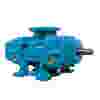How Industrial Vacuum Pumps Work
The working principle of an industrial vacuum pump is based on suction and pressure reduction. By extracting air or gas from a closed chamber, the pump lowers the internal pressure, creating the vacuum necessary for a wide range of industrial applications.
There are different technologies that determine their operation:
Wet vs Dry Pumps: Wet pumps use a liquid such as oil or water for sealing and lubrication, making them suitable for processes where moisture is acceptable. Dry pumps, on the other hand, operate without fluids, ensuring purity and preventing contamination in sensitive environments.
Oil-Free vs Oil-Sealed: Oil-sealed pumps achieve higher vacuum levels by using oil as a sealing medium, while oil-free pumps guarantee clean operation in industries that demand aseptic conditions.
In principle, a vacuum pump operates in a similar way to a compressor, but with one key difference: instead of compressing air or gas, its function is to extract and evacuate it to achieve the required vacuum level.








